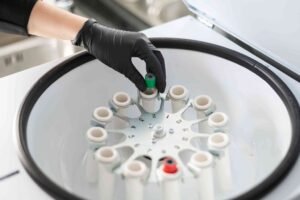How Age Affects Fertility?
Let’s face it—reproductive health is one of those topics that doesn’t come up until it has to. For many people, starting a family might seem like something that’ll happen “someday,” often after career goals are met, finances are stabilized, or the perfect partner comes along. But what most of us don’t think about (or at least not right away) is how age affects fertility—and not just for women, but for men too.
You’ve probably heard that “biological clocks” are ticking. Maybe you’ve even felt yours ticking, loud and clear. But what does that really mean? Does turning 30 or 35 actually make a difference? And if so, how? Let’s dive in and unpack how age plays a role in fertility, and what you can do about it.

Understanding How Age Affects Fertility?
Before we get into the nitty-gritty science stuff, here’s a quick truth bomb: fertility doesn’t stay the same throughout your life. It’s not a switch that’s either on or off—it gradually declines over time. For women, this decline can start as early as the late 20s, and for men, while it’s a bit more gradual, age can still take a toll on reproductive potential.
Understanding how age affects fertility is crucial for anyone who wants to have biological children, whether now or in the future. We live in a world where people are waiting longer to start families. That’s not necessarily a bad thing—maturity, stability, and experience are great things to bring to parenthood—but it does mean we need to be aware of the timeline our bodies are working with.
The Biological Clock: What It Really Means
For women, fertility is largely tied to the number and quality of eggs in the ovaries. You’re born with all the eggs you’ll ever have—around 1 to 2 million. By puberty, that number drops to about 300,000 to 500,000. And only around 300 to 500 will actually be ovulated during a woman’s reproductive years. That’s the first piece of the puzzle in understanding how age affects fertility.
As you get older, both the quantity and quality of your eggs decline. By age 30, your chances of getting pregnant start to dip. By 35, the decline picks up pace. And after 40, things get significantly tougher. It’s not impossible, but it’s definitely more challenging.
For men, the situation is a bit different. Men produce new sperm continuously, but that doesn’t mean age doesn’t matter. Sperm quality can decline with age, affecting motility (how well sperm swim), morphology (shape), and DNA integrity. While men can technically father children into their later years, age affects fertility for them too—just in less obvious ways.
Fertility Through the Decades
Let’s take a closer look at what typically happens with fertility as we move through different age ranges.
In Your 20s
Your 20s are considered the “prime time” for fertility. Ovulation is regular, eggs are typically healthy, and sperm quality is high. For couples trying to conceive, the chances of getting pregnant each cycle are about 25-30%. That’s actually the highest it’ll ever be.
But here’s the catch—many people in their 20s aren’t ready to start families yet. And that’s okay. It’s just worth noting that if you’re thinking about having children someday, this is a good time to start planning and learning how age affects fertility so you’re not caught off guard later.

In Your 30s
Your early 30s are still a fairly good time for conception. Fertility declines slowly between 30 and 34. However, after 35, that decline becomes more noticeable. This is the age when doctors often start using the term “advanced maternal age” for women, simply because the risks for complications (like miscarriage or chromosomal abnormalities) begin to rise.
For men, fertility is still generally stable in the early 30s, but sperm quality can start to dip as the decade progresses. Understanding how age affects fertility at this stage can help couples make informed choices—whether that means trying sooner, freezing eggs or sperm, or exploring fertility tracking apps and tests.
In Your 40s and Beyond
This is when things get a lot more complicated. Women in their 40s experience a significant decline in both egg quality and quantity. Ovulation becomes less predictable, and the likelihood of conception without assistance drops to about 5% per cycle (or even less).
Men in their 40s can still conceive, but the chances of fathering a child with a genetic disorder or facing pregnancy complications increase. Again, this doesn’t mean parenthood is off the table—it just means understanding how age affects fertility becomes absolutely essential if you’re trying at this stage.

The Emotional Side of Aging and Fertility
This isn’t just about biology. There’s a real emotional toll that can come with trying to conceive at an older age. People often feel blindsided when they find out it’s not as easy as they expected. They may feel frustrated, anxious, or even guilty—like they waited “too long.”
Let’s clear something up: there’s no shame in waiting to start a family. Life doesn’t follow a neat timeline. What does help is going in with your eyes open. If you know how age affects fertility, you can prepare emotionally and physically—and hopefully reduce the stress that often accompanies the journey.

Assisted Reproductive Technology (ART) and Age
Thankfully, medical advances have opened up a lot of options. In-vitro fertilization (IVF), intrauterine insemination (IUI), egg freezing, donor eggs and sperm—these tools can be lifesavers for couples who face age-related fertility issues.
But here’s the kicker: even with all this tech, age affects fertility outcomes with ART too. IVF success rates decline with age, especially after 40. The quality of eggs plays a big role, and while younger women might have success with their own eggs, older women often require donor eggs to increase their chances.
Men can also benefit from ART, especially when sperm quality is compromised. However, even the most advanced treatments can’t completely override the effects of time.
Egg and Sperm Freezing:
Freezing eggs or sperm is one way people are taking control of their reproductive timelines. Egg freezing used to be considered experimental, but it’s now a widely accepted option for women who want to preserve their fertility.
The catch? The best time to freeze your eggs is when you’re least likely to be thinking about it—your 20s or early 30s. The younger the eggs, the better the chances later. So again, being aware of how age affects fertility gives you options. It doesn’t mean you have to rush into parenthood—it just means you can create a safety net if that’s something you want.
Sperm freezing is less time-sensitive but still useful, especially if a man is undergoing medical treatments or working in high-risk environments. It’s a relatively simple and cost-effective process.

What About Lifestyle and Fertility?
While age is a major factor, it’s not the only one. Lifestyle plays a huge role in reproductive health, and in some cases, it can either buffer or exacerbate the effects of aging.
Here are some key lifestyle factors that influence fertility:
- Diet: A balanced, nutrient-rich diet supports hormonal balance and reproductive function.
- Exercise: Regular physical activity helps, but excessive training (especially for women) can disrupt cycles.
- Sleep and Stress: Chronic stress and poor sleep can mess with hormones and ovulation.
- Smoking, alcohol, and drug use: All of these negatively impact egg and sperm quality.
- Environmental toxins: Exposure to certain chemicals can impair fertility over time.
Addressing these areas might not completely offset how age affects fertility, but they can certainly improve your odds—and your overall health.
When to Seek Help
If you’ve been trying to conceive for a while and nothing’s happening, it’s time to talk to a fertility specialist. The general rule is:
- Under 35: Try for one year before seeking help.
- Over 35: Try for six months before seeing a specialist.
- Over 40: Talk to a provider before trying, just to get a baseline.

Time matters when it comes to fertility. The sooner you understand how age affects fertility, the more empowered you’ll be to take the right steps—whether that means trying naturally, exploring treatment, or taking a different path altogether.
Final Thoughts:
Here’s the bottom line: Age affects fertility—for everyone. It’s not something we can ignore, and it’s not something we should fear either. It’s simply one piece of the puzzle. And like any health-related issue, the more you know, the better choices you can make.
Whether you’re thinking about kids next year or a decade from now, now’s the time to learn, plan, and consider your options. Your journey is unique, and there’s no one-size-fits-all answer. But knowledge—especially about how age plays a role—puts the power back in your hands.


